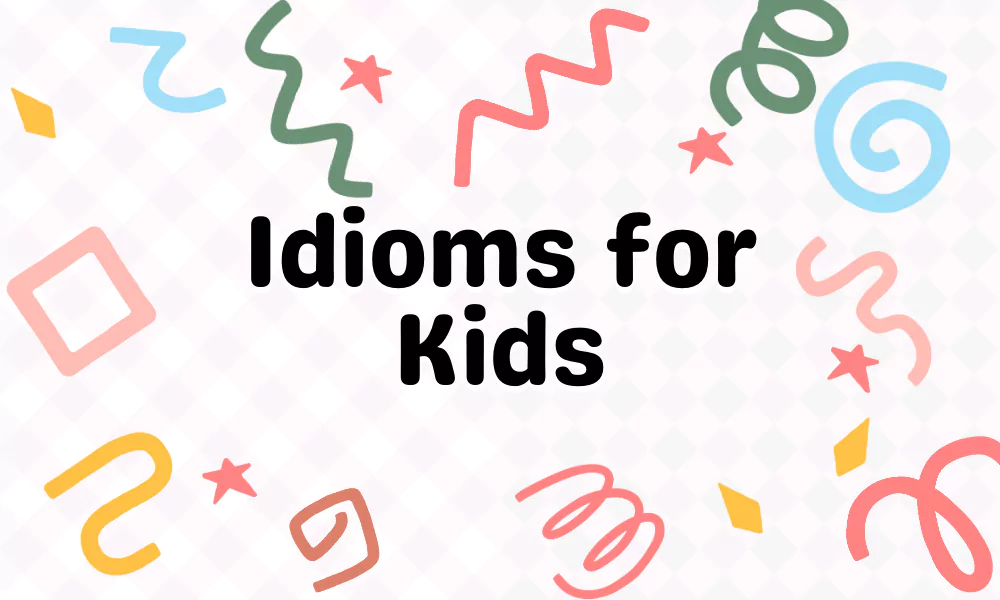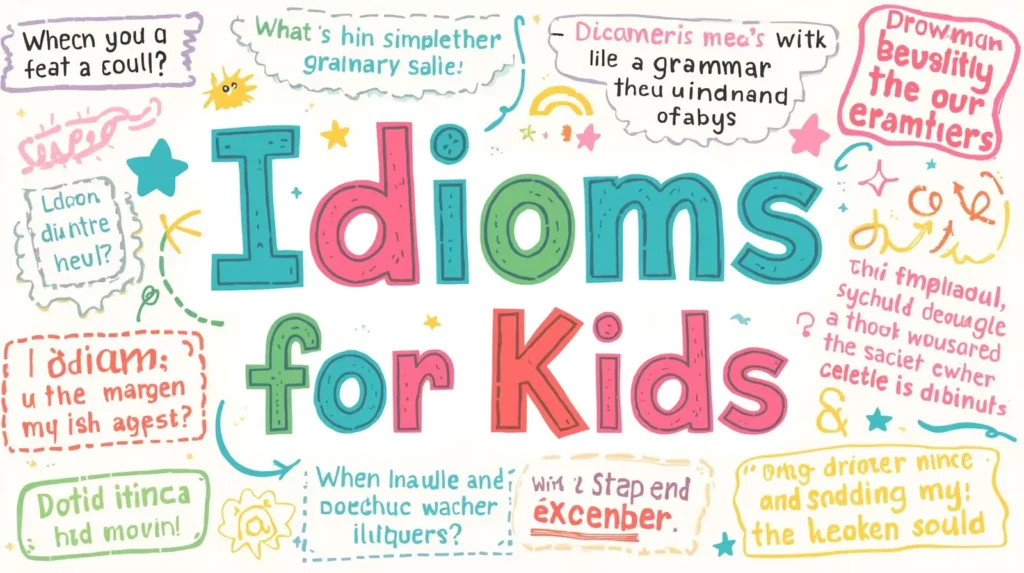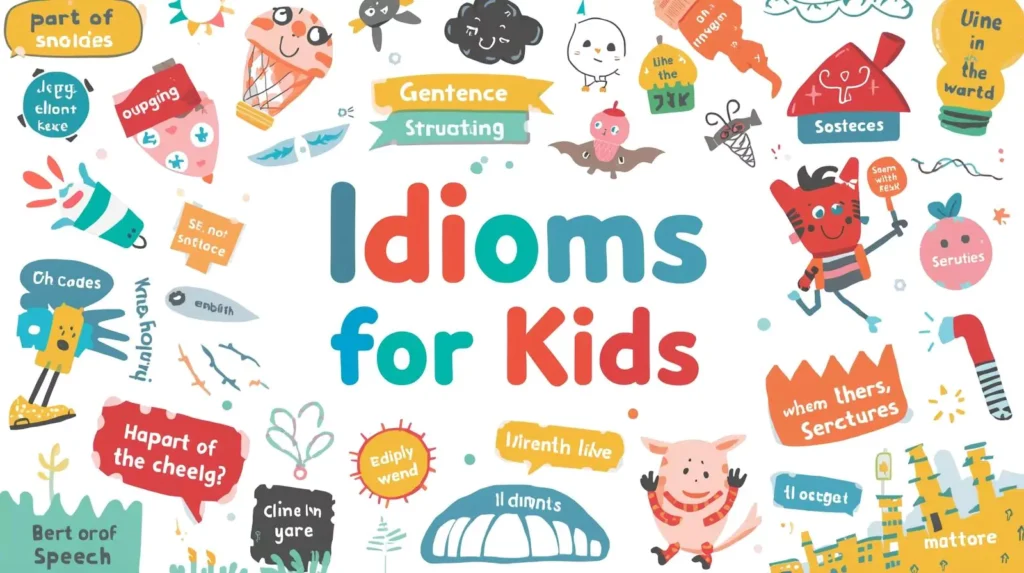Idioms for Kids – Simple Meanings and Examples for Children

Idioms are like little puzzles in the English language that express the fun but don’t always mean exactly what they say. For example, if someone says, “It’s raining cats and dogs,” they don’t really mean animals are falling from the sky, it just means it’s raining very heavily! For kids, idioms can seem tricky at first, but once they understand them, these phrases make conversations, stories, and even school writing much more colorful and creative. Learning idioms not only helps children improve their vocabulary, but also gives them a peek into the culture, humor, and history behind the language.
What Are Idioms for Kids?
Idioms are special phrases where the words don’t mean exactly what they say. Instead, they have a hidden or figurative meaning. For example, when someone says “spill the beans,” it doesn’t mean dropping real beans, it means sharing a secret! For kids, idioms are a fun way to play with language, making everyday conversations and stories more lively and creative. Learning idioms helps children understand English better, improve their writing, and enjoy the humor and imagination that comes with these expressions.

Commonly Used Idioms for Kids
- Break the ice – To start a conversation.
Example: The teacher told a joke to break the ice on the first day of school. - Piece of cake – Something very easy.
Example: The math homework was a piece of cake for Mia. - Hit the hay – To go to bed.
Example: I’m tired, it’s time to hit the hay. - Cool as a cucumber – Very calm.
Example: He stayed cool as a cucumber during the spelling test. - Let the cat out of the bag – To reveal a secret.
Example: Sam let the cat out of the bag about the surprise party. - Butterflies in my stomach – Feeling nervous.
Example: I had butterflies in my stomach before the play started. - Under the weather – Feeling sick.
Example: I stayed home because I was under the weather. - Spill the beans – To tell a secret.
Example: Don’t spill the beans about our science project idea! - All ears – Listening carefully.
Example: The class was all ears during the story. - Hit the books – To study.
Example: I need to hit the books before the exam. - On cloud nine – Extremely happy.
Example: She was on cloud nine after winning the race. - Cry over spilled milk – Worry about something that cannot be changed.
Example: It’s just a broken toy, no need to cry over spilled milk. - Raining cats and dogs – Raining heavily.
Example: We stayed inside because it was raining cats and dogs. - Bite off more than you can chew – Take on more than you can handle.
Example: He bit off more than he could chew by joining three clubs. - Early bird catches the worm – The one who starts early succeeds.
Example: She got the best seat because the early bird catches the worm. - Hold your horses – Wait or be patient.
Example: Hold your horses, we’ll leave in five minutes. - Burn the midnight oil – Work late into the night.
Example: I burned the midnight oil finishing my project. - The ball is in your court – It’s your turn to act.
Example: I finished my part, now the ball is in your court. - Don’t judge a book by its cover – Don’t judge based on appearance.
Example: Don’t judge a book by its cover; he’s really kind. - Hit the nail on the head – To be exactly right.
Example: You hit the nail on the head with that answer. - Practice makes perfect – The more you practice, the better you get.
Example: Keep playing piano, practice makes perfect! - Fish out of water – Feeling out of place.
Example: I felt like a fish out of water at the dance class. - Jump the gun – Do something too soon.
Example: He jumped the gun and answered before the question was finished. - Once in a blue moon – Very rarely.
Example: We go to the amusement park once in a blue moon. - In hot water – In trouble.
Example: I was in hot water for forgetting my homework. - Hit the road – To leave or begin a journey.
Example: We hit the road early for our trip. - Pull someone’s leg – To joke with someone.
Example: Don’t believe him, he’s just pulling your leg. - Break a leg – Good luck.
Example: The teacher told the actors to break a leg before the play. - Eat like a bird – Eat very little.
Example: She eats like a bird at lunch. - Eat like a horse – Eat a lot.
Example: He eats like a horse after soccer practice. - When pigs fly – Something impossible.
Example: He’ll clean his room when pigs fly. - Don’t put all your eggs in one basket – Don’t rely on only one plan.
Example: She applied to many schools so she didn’t put all her eggs in one basket. - Keep your chin up – Stay positive.
Example: Keep your chin up, tomorrow will be better. - Cost an arm and a leg – Very expensive.
Example: That video game costs an arm and a leg! - Time flies – Time passes quickly.
Example: Time flies when you’re having fun. - A dime a dozen – Very common.
Example: Pencils are a dime a dozen at school. - Out of the blue – Suddenly.
Example: Out of the blue, she started singing. - Put on your thinking cap – Start thinking seriously.
Example: Put on your thinking cap and solve this puzzle. - Straight from the horse’s mouth – From a reliable source.
Example: I heard it straight from the horse’s mouth that there’s no homework. - Keep an eye on – Watch carefully.
Example: Please keep an eye on my puppy while I’m gone. - Go the extra mile – Do more than expected.
Example: She went the extra mile to help her friend study. - Every cloud has a silver lining – There’s good in every bad situation.
Example: Missing the bus was bad, but every cloud has a silver lining, we played a game together while waiting. - Rome wasn’t built in a day – Great things take time.
Example: Learning to draw takes practice, Rome wasn’t built in a day. - As busy as a bee – Very busy.
Example: She’s as busy as a bee preparing for the fair. - On thin ice – In a risky situation.
Example: He’s on thin ice after forgetting chores again. - Let sleeping dogs lie – Don’t start trouble again.
Example: Just let sleeping dogs lie, don’t bring up the fight. - Pull yourself together – Calm down.
Example: Pull yourself together and finish the test. - Throw in the towel – To give up.
Example: He threw in the towel after losing three games. - Bend over backwards – Try very hard to help.
Example: She bent over backwards to make her friend happy. - In the same boat – In the same situation.
Example: We’re all in the same boat with this homework.
Rare and Unique Idioms for Kids
- Cat’s pajamas – Something great.
Example: That toy is the cat’s pajamas! - Hold your tongue – Stay quiet.
Example: He had to hold his tongue during the argument. - Elephant in the room – An obvious problem people ignore.
Example: The broken window was the elephant in the room. - Cold feet – Nervous before something big.
Example: She got cold feet before the performance. - Kick the bucket – To die (gentle version for kids).
Example: In the story, the old farmer kicked the bucket. - Go bananas – Go crazy with excitement.
Example: The kids went bananas at the party. - In a pickle – In a difficult situation.
Example: I was in a pickle when I lost my lunch money. - Chew the fat – Chat casually.
Example: We sat on the porch and chewed the fat. - Monkey business – Fooling around.
Example: Stop the monkey business and do your homework! - Cat got your tongue? – When someone is unusually quiet.
Example: Why so quiet, cat got your tongue? - Out of the woods – Free from danger.
Example: He’s out of the woods after his illness. - Zip your lip – Stay silent.
Example: Zip your lip during the movie. - Kick up a fuss – Complain loudly.
Example: He kicked up a fuss when bedtime came. - Jump on the bandwagon – Join something popular.
Example: Everyone jumped on the bandwagon and started playing soccer. - Shake a leg – Hurry up.
Example: Shake a leg, the bus is here! - Sleep like a log – Sleep deeply.
Example: I slept like a log after the trip. - Throw cold water on – Discourage something.
Example: Don’t throw cold water on my idea. - Grin from ear to ear – Smile widely.
Example: She was grinning from ear to ear after winning. - Catch someone red-handed – Catch someone doing wrong.
Example: I caught him red-handed eating cookies. - Have a whale of a time – Have a lot of fun.
Example: We had a whale of a time at the zoo.
Kids Idioms in Literature and Pop Culture
- Down the rabbit hole – Entering a strange adventure (Alice in Wonderland).
Example: Reading that fantasy book felt like going down the rabbit hole. - Off with his head! – Harsh punishment (Alice in Wonderland).
Example: The queen shouted, “Off with his head!” - Peter Pan syndrome – Refusing to grow up (Peter Pan).
Example: He never wants responsibility, he has Peter Pan syndrome. - Big Brother is watching you – Being monitored (1984).
Example: The cameras made us feel like Big Brother is watching. - Cry wolf – Raise a false alarm (Aesop’s Fables).
Example: Don’t cry wolf, or no one will believe you. - Trojan horse – Something deceptive (Greek Mythology).
Example: The gift was a Trojan horse, it had a trick inside. - Pandora’s box – Source of endless troubles (Greek Mythology).
Example: Opening the app was like opening Pandora’s box of spam. - King’s ransom – Something very valuable (Fairy Tales).
Example: That diamond is worth a king’s ransom. - Midas touch – Ability to make everything profitable (Greek Mythology).
Example: She has the Midas touch in business. - Sword of Damocles – Constant threat (Greek Mythology).
Example: The deadline hung over him like the sword of Damocles. - Catch-22 – A no-win situation (Catch-22).
Example: It was a catch-22, you need experience to get the job, but a job to get experience. - White whale – An obsession (Moby Dick).
Example: That puzzle became his white whale. - Achilles’ heel – A weakness (Greek Mythology).
Example: Ice cream is my Achilles’ heel. - Romeo and Juliet – Doomed romance (Shakespeare).
Example: Their friendship was like Romeo and Juliet’s love story. - Jekyll and Hyde – Dual personality (Dr. Jekyll & Mr. Hyde).
Example: He’s nice sometimes but mean other times, a real Jekyll and Hyde. - Quixotic quest – Unrealistic adventure (Don Quixote).
Example: Chasing treasure in the backyard was a quixotic quest. - Sherlock Holmes moment – Clever deduction (Sherlock Holmes).
Example: I had a Sherlock Holmes moment and solved the riddle. - Open sesame – Magical entry (Ali Baba & Forty Thieves).
Example: Saying the password was like shouting “Open sesame!” - Sleeping beauty – Someone who sleeps a long time (Fairy Tale).
Example: He was a sleeping beauty on Saturday morning. - Pied Piper – Someone who leads others, often blindly (Folklore).
Example: The coach was like the Pied Piper, and all the kids followed him.

Tips for Using Kids Idioms in Writing and Speech
- Use Idioms as Story Starters – Begin a story or essay with an idiom to grab attention. For example: “It was raining cats and dogs when Mia discovered the treasure.”
- Pair Idioms with Visuals – Kids learn faster when they see funny drawings of idioms (like cats and dogs falling from the sky). This makes meanings memorable.
- Blend Idioms with Dialogue – Encourage kids to use idioms in conversations between characters. It makes writing sound more natural and lively.
- Create Idiom Collections by Theme – Group idioms by weather, animals, food, or school life. This helps children use them in the right context.
- Invent Personal Idiom Stories – Ask kids to write short stories or doodles around an idiom. For example, a comic where someone literally “spills the beans.”
Read: Idioms for Sick
Synonyms and Alternatives for Kids
| Synonyms | Meanings |
|---|---|
| Children | The standard word for young people. |
| Youngsters | Energetic and lively young people. |
| Little Ones | A warm, affectionate term for kids. |
| Tykes | Informal, playful term for small children. |
| Juniors | Refers to younger members in school or sports. |
| Minors | A legal term for people under 18. |
| Infants | Very young babies or toddlers. |
| Schoolchildren | Kids attending school. |
| Youth | A broad term for young people in general. |
| Toddlers | Very young children who are learning to walk. |
FAQs
Conclusion
Idioms for kids are more than just fun phrases but they’re powerful tools that make learning English creative, engaging, and memorable. By introducing children to idiomatic expressions, we give them the chance to understand language beyond its literal meaning, boost their vocabulary, and make storytelling more colorful. Whether it’s “raining cats and dogs” or “spill the beans,” these phrases help kids connect with culture, humor, and imagination. With practice, children will not only recognize idioms in reading and conversations but also use them confidently in their own speech and writing.
